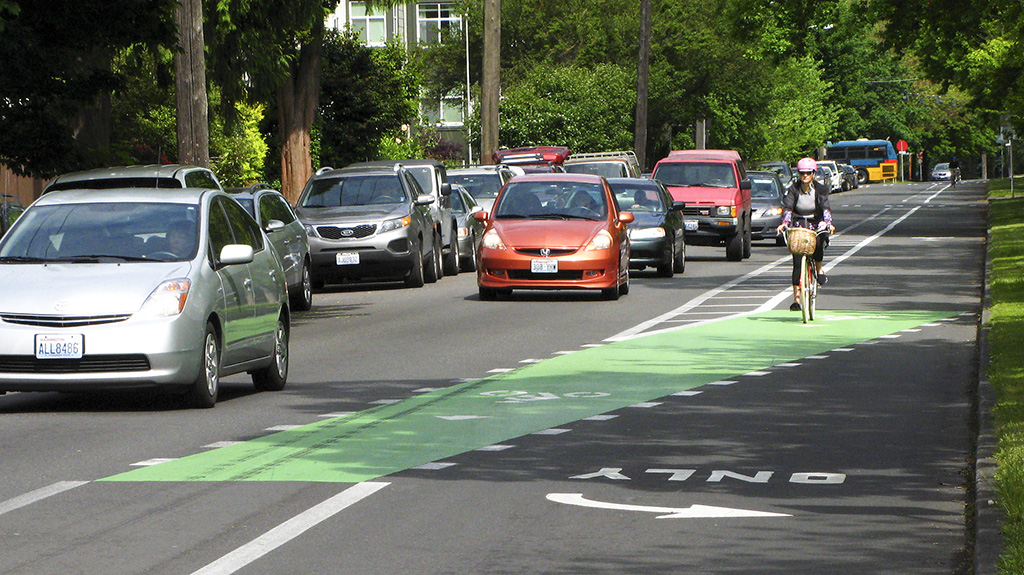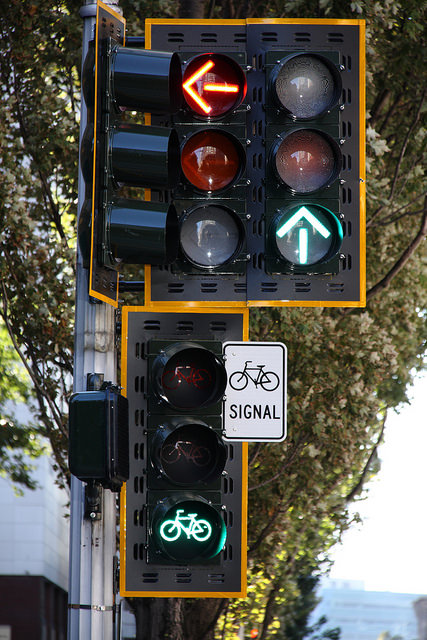Autumn Gear Guide
Find inspiration in our Gear Guide that will keep you out on your bike through wind or rain.
Download NowWord choice can drastically change the way others perceive actions as simple as riding a bicycle.

Photo by Gary Howe
The language we use shapes our perceptions of the world around us and the people we interact with. If you were tuned into Seattle, WA’s, transportation debates in 2010, the first thing you would have heard about is the “war on cars”. Calls for more bike lanes and safer streets were being depicted in mainstream media as a militant attack on the rights of automobile drivers by the warring mobs of cyclists. This statement, a war on cars, was often left unquestioned, and led to a pervading sense of animosity amongst many of the city’s residents.
By crafting an illusion of war between the polarized identities of drivers and cyclists, the media created a very real battleground that played out on the city’s roads, often with devastating results. Consequently, the rate of deaths and injuries to people riding bikes was rapidly rising.

Photo by Seattle Department of Transportation
In 2011, at the height of this “war on cars”, Seattle resident Cathy Tuttle founded a small non-profit, Seattle Neighborhood Greenways. While the SNG publicly advocated for biking, they never publicly labeled themselves cycling advocates. In light of the “war”, they opted for the less inflammatory title, “neighborhood advocates.” Rather than referring to drivers or cyclists they referred to people driving cars or people riding bikes. A traffic accident became a collision, not some accident of machinery or fate but the result of conscious decision-making on the part of the individuals in control of each vehicle.
The effect was remarkable. Slowly but surely, the war on cars language changed. People from team “driver” and team “cyclist” were both able to identify roles for themselves in team “neighborhood”. In just four years, Seattle went from being the battleground for one of the most divisive transportation debates in the country to having one of the country’s most progressive transportation agendas. Tune in today and you’ll see a recently launched public bike share system, 20 miles (32 km) of new bike lanes set to be constructed, falling congestion, and a steady incline in public transit use, biking, and walking.
The dramatic effects of the SNG’s language choices can be chalked up to the reintroduction of people into the discussion. A dialogue that involves cars versus bikes or drivers versus cyclists has the effect of erasing the human element and creating fixed, faceless identities based solely on these different modes of transportation. Cyclists are positioned in constant opposition to drivers, as if a person who rides a bike never drives a car, and a person driving a car never rides a bike. When we remove people from the equation and instead frame the debate using these polarized, homogenous identities, we open the door to a degree of animosity that would be unthinkable if everyone was forced to acknowledge the individuals on the other side. By including people in the biking lexicon, we reintroduce empathy into the debate.
Similarly, the way we talk about riding bikes within the community of regular riders has also been taken into consideration. When we talk about cycling, what are we referring to? For many North Americans, “cycling” conjures up images of lycra-clad athletes racing down roadways or adventurers with loaded panniers touring the countryside.
This is still cycling, of course, but it doesn’t necessarily represent that type of cycling that many – or even a majority – of people riding bikes identify with. When the terminology associated with the activity is limited to a word that evokes images of a somewhat exclusive activity, it has the effect of alienating large swaths of people who don’t feel they have a place or a voice in the community.
So what of the people riding bikes simply to get from point A to point B? A recent PeopleForBikes poll of 2,150 regular bike riders found that “everyday biking” is the preferred term for people who ride for transportation. Everyday biking is biking to school, to work, to run an errand, or to simply cruise around in good weather. It’s the type of biking that requires little preparation and no special uniform, and isn’t only the realm of recreational sport riders or conditioned athletes.
By referring to cyclists as people riding bikes and to non-sport cycling as everyday riding, we normalize biking as an approachable daily activity that is both casual and inclusive, and create conditions that don’t pit people on bikes against people in cars. We’re all just people, and sometimes some of us ride bikes.
Find inspiration in our Gear Guide that will keep you out on your bike through wind or rain.
Download Now
Good article. We tend to polarize discussions in the U.S. with predictable results–growing animosity and distance between each other on a host of issues. Everyone involved in advocacy, regardless of the issue, should read this.
Hooray! Nice article. Thank you, Hilary.
I’m an everyday cyclist and a recreational cyclist, and love both.
I ride my my Bicycle. Or I am a bicyclist. I am not a Cyclist which refers to sports supreme Olimpic Teams, Racing etc. Dress casual. If you live down here in New Zealand one must wear a helmet.
Good topic choice. There’s too much of a tendency to polarize in the U.S. these days…
I agree with the the previous commenter – I too feel very excluded by the cycling community… I ride my bike to get around a few times a week, but would never call myself a cyclist. ‘People who ride bikes’ also includes those who have many different ways of getting around in their lives. Much more inclusive.
I share AM Sorenson’s comments. I don’t want a fancy bike and bike clothing. I ride my bike from point A to Point B and really the only thing beyond riding from point A to B is to be able to do it safely. Thank you for the well-written article.
What !! I Am again a part of the bicycling community?? I am part of ‘everyday biking’?? I think this article is beautifully written, very thoughtful. I had felt separated by so many things (big money, fancy bikes, fancy equipment, fancy trips) that were summarized when I heard one biker complain about others with the criticism ‘Don’t be such a ‘roadie” and saw the truth in it. I had felt ‘everyday biking’ wasn’t ‘valid’, I felt excluded. I think this article is very ‘inclusive’, encouraging. Thank you for crafting such an article !!!
Comments are closed.